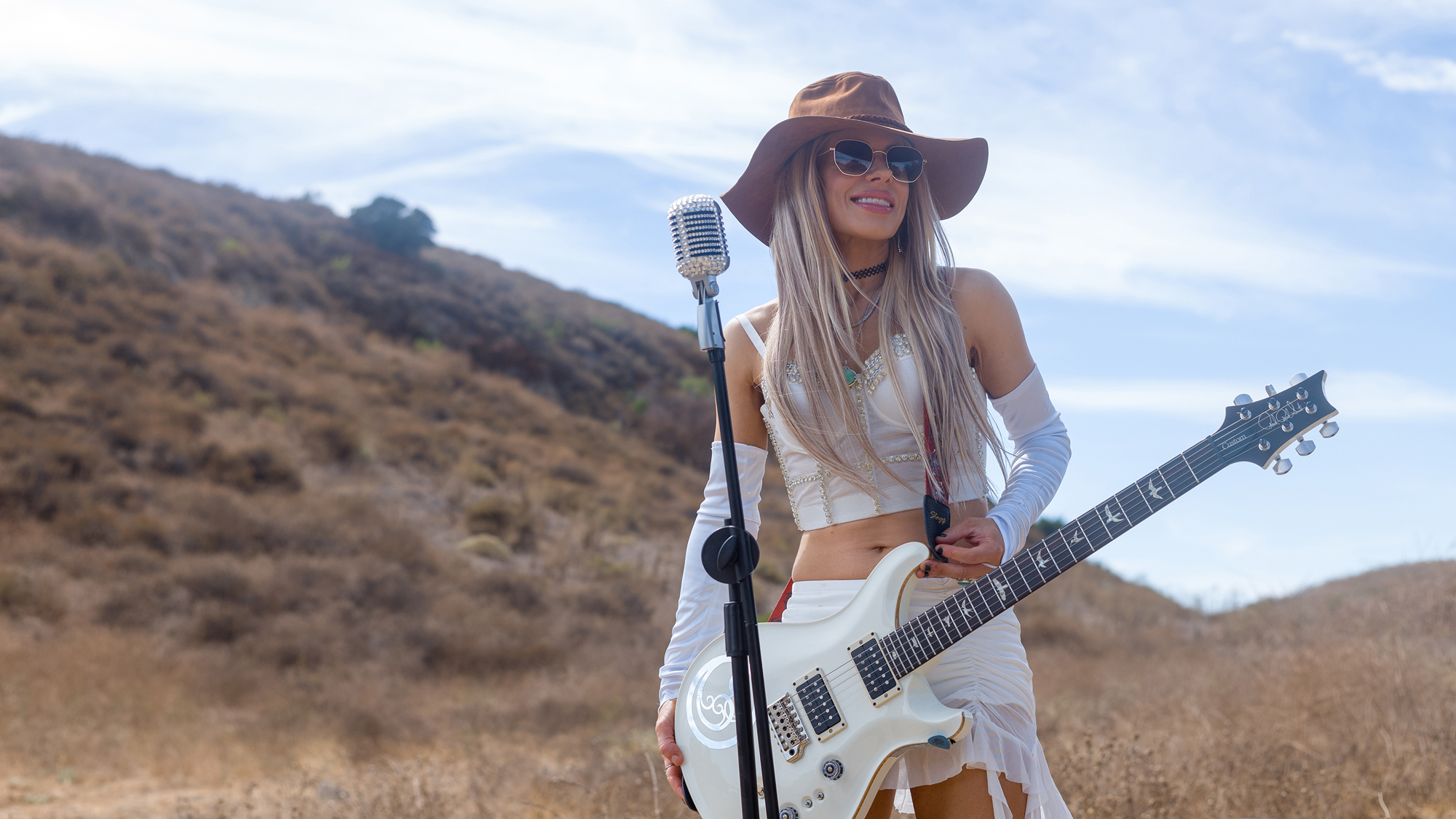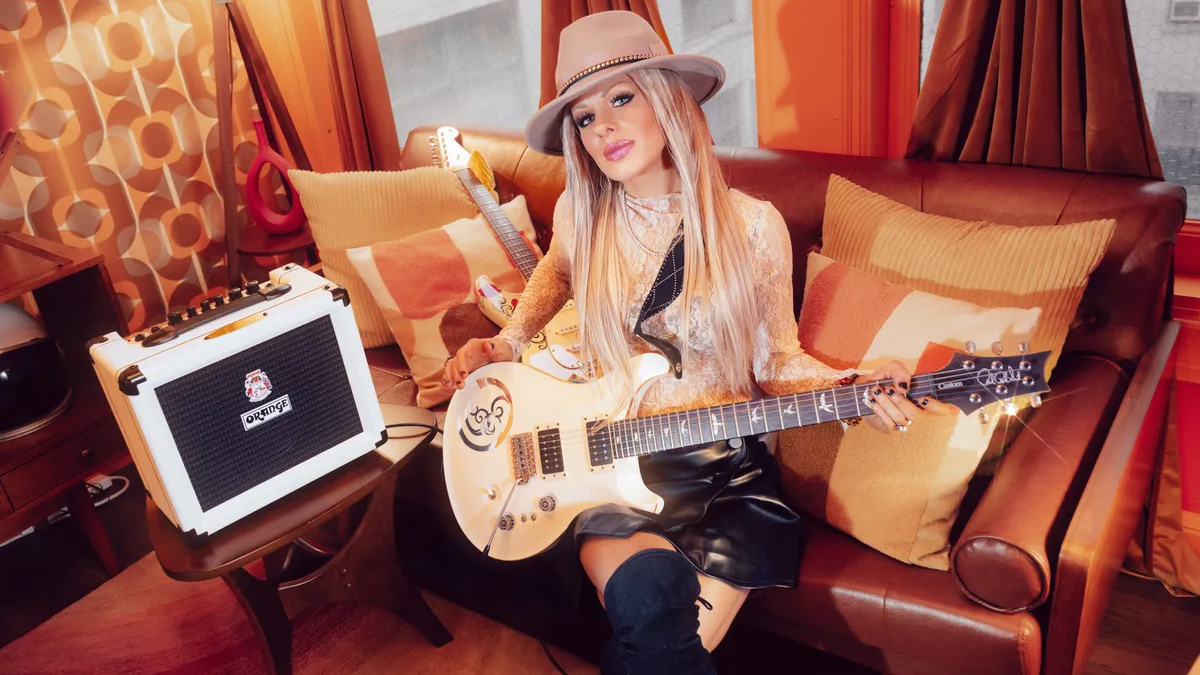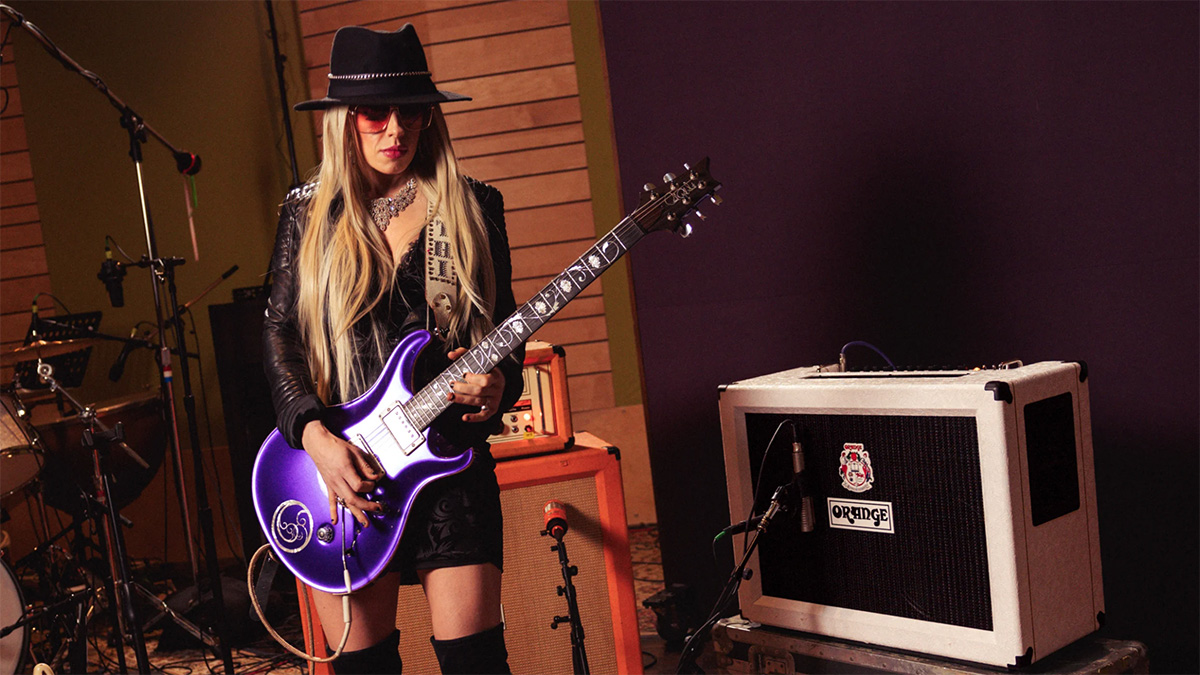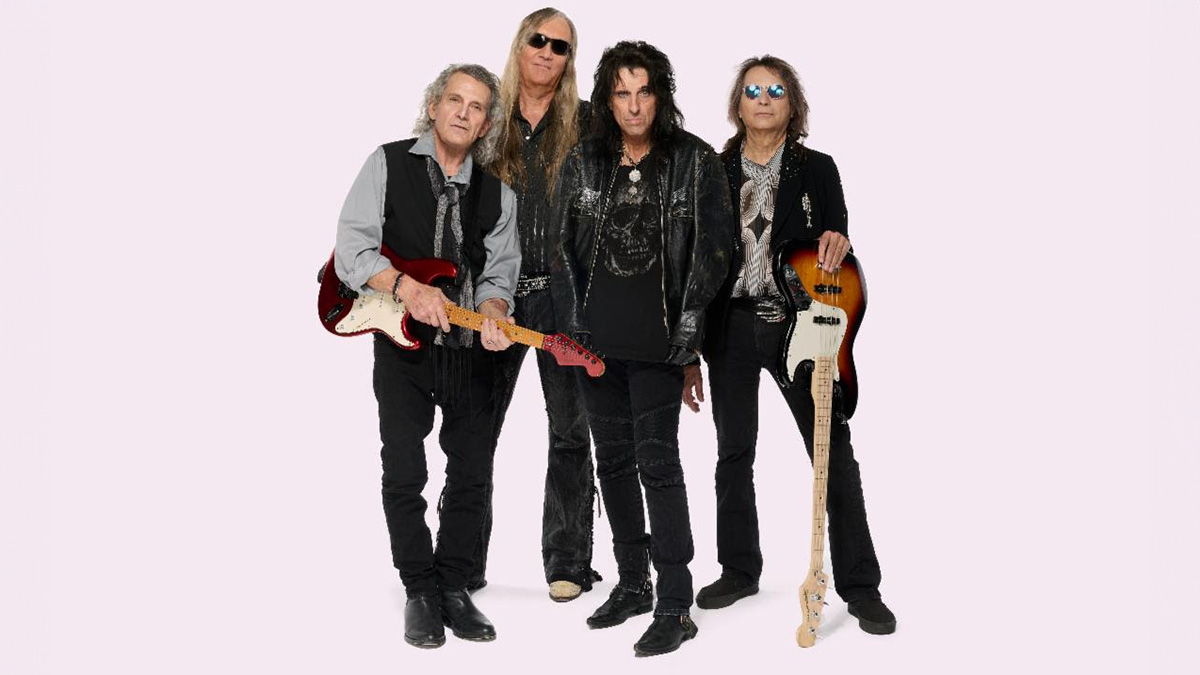“I have a fingerprint of the way I play – a mix of Carlos Santana, Stevie Ray Vaughan and Gary Moore – but I’m constantly evolving”: Orianthi on why she loves old gear – and recording her new Band of Gypsys-inspired supergroup with Jimi Hendrix’s producer
The former guitarist for Michael Jackson and returning Alice Cooper member has survived the trials and tribulations of the pop industry, emerging with a new energy and sound that honors her true inspirations and talents

Orianthi is busy as hell. She’s riding high after her last two records – 2020’s O and 2022’s Rock Candy – showed the world that she’s not only a great singer and performer but a titan on guitar, too. It wasn’t always that way, though, not that people knew any better.
Had the music industry had its way, Orianthi – who had a massive pop hit with her 2009 single According To You – would have been chewed up and spat out. But that’s not how it went down. And the best part is that now it’s Ori’s way or the highway.
“I’ve been through a lot in this industry,” she tells Guitarist. “I really have [sighs]. I manage myself; I’m doing business 24/7. I have an incredible team around me, but, ultimately, I make the final decisions. In the beginning, being signed in such a big situation and having a whole circus around me… To be honest, as I’ve gotten older, I’ve realised that life is short, and every day when you wake up do something a little different.”
Orianthi has gone from topping the pop charts to integrating herself deeply within the blues, rock and guitar spaces. From the outside looking in, her rise and subsequent pivot seemed easy – but it wasn’t. “I hate the music business,” she insists. “But I love music. God, I love it so much.”
Which is why Ori is recording not one but two records. The first, a blues-rock-leaning affair produced by Kevin Shirley, and the second, an Eddie Kramer-produced jam-meets-psych record with drummer Cindy Blackman Santana and bassist Rhonda Smith; the latter album is another animal altogether.
As for how she balances it all, she says: “Gratitude is very important. So many successful people are miserable and, honestly, I wasn’t enjoying myself at the beginning. I was very unhappy, alone and upset. I was constantly going, ‘I’m not good enough. I need people to help me.’”
But it’s not like that any more. “Everything we need is within ourselves,” she says. “Taking the time to find it is part of your journey as a human. I’m very into the spiritual realm because everything has an energy around it that resonates. And when you hear it, that moves you.”
Get The Pick Newsletter
All the latest guitar news, interviews, lessons, reviews, deals and more, direct to your inbox!
Few have been able to wrench themselves from the clutches of pop stardom and pivot toward halcyon guitar infamy, but Orianthi has. And yet she’s chill about it, aiming to be a positive force for others, rather than leading with an ego.
I’m trying to get better. I’ve never stopped learning and want to be a better guitar player
“You can be a [woman] in this industry and be successful,” she says. “I learned from guys, but my whole thing is it doesn’t matter if you love playing. You just play, right? If you dedicate your time to what you love, it doesn’t matter if you’re male or female. That’s really important. It’s about being your own person, going with it and being authentic.”
You’ve dialled in your sound over your last couple of records. What’s been the key to that?
“I’m trying to get better. I’ve never stopped learning and want to be a better guitar player. I also want to be a better singer and songwriter because everyone has their own mind, fingerprint and journey. There were quite a few records where I was told the parameters, like, ‘This is what you have to do. You have to make a heavy record,’ or ‘You have to make a pop record.’
“I was told what to do, but I wanted to play guitar. There’s freedom in that. You learn that there’s people out there that you’ll find who think they own you… but the label I’m working with now [Woodward Avenue Records] truly believes in me as an artist.”
Are your two latest tracks, First Time Blues and Ghost, indicators of where you’re going?
“Yes. And soon we’re putting out Some Kind Of Feeling [available now], which is quite different. I wrote Some Kind Of Feeling a while ago on acoustic and it’s got a soul kind of feel. People might think it’s quite a departure, but I figured, ‘You know what? I put out enough heartbreak songs. Why not put out a happy song to manifest some good shit?’
“I don’t want to be a person who only writes songs about a horrible relationship. This is about love, connection, what music does and what somebody can do when they come into your life. It can be love, a friend or a person… It’s just about feeling good. Life is all about connections for me, and this song represents that. I really dig the new vibe… it’s really different.”

It’s part of a larger album you’re working on with Kevin Shirley. But you’re also working on another album with Eddie Kramer.
“So [I] self-produced First Time Blues and Ghost; the rest of the album is produced by Kevin Shirley. He’s a master, he’s freakin’ great. My solo album is coming out, and Kevin and I are producing it.
“The second record I’m doing is a side project, a supergroup with Cindy Blackman Santana and Rhonda Smith. It’s a three-piece, like a Band Of Gypsys vibe but the tunes are commercial and we hope to reach a lot of people. We’ve moulded our own sound with Eddie Kramer. It’s an honour to record with him and I’m excited for everyone to hear. We’re nearly done with that record – so it’s two.”
How has Eddie impacted you as a guitarist?
“He’s a legend, incredible, and he definitely has brought out something that other producers haven’t with his energy alone. Eddie focuses on getting the right microphone placement and works his magic. He’s always twiddling around with the knobs in the studio and getting the right compression and settings. It’s very old-school and interesting. I love watching Eddie in the studio when he’s panning and doing wild shit.
“We did a 25-minute jam, which will be on the record, and he had to mix that. He was sweating afterward! We go off on these tangents. I don’t know… we’re on some weird frequency where we cut it and it was just wild.
“And Eddie, because I’m such a huge Hendrix fan, I respect him so much. He suggests things like, ‘Why don’t you try this amplifier, this setting, this pedal or this guitar?’ I’ll try whatever he calls for, you know? My heart is open. Being in the studio with Eddie Kramer and Kevin is an honour.”
How does working with Kevin Shirley compare?
“He gets such a great sound and incredible guitar tones. We’ll do takes until I get it right, and it’s just very inspiring. Kevin does things a different way. The way he mics things up and goes through things with me, like, ‘Yeah, this guitar didn’t work too bad,’ or ‘Maybe we’ll try this at this part,’ it’s really wonderful. I’m grateful to have them both on these records coming out next year.”
Is there a throughline between the two projects?
“With Eddie, I kind of got into the psychedelic realm of my childhood from when I was 14 or 15, when I was just sitting in my room, listening to Hendrix and experimenting. With Eddie, there’s a lot more searching – and with Kevin, it’s more structured in how I approach the solos.”
Is that intentional?
“Well, it’s structured with both but wildly structured with Eddie. I want the sounds to be different. I don’t want people to go, ‘Yeah, this group project sounds the same as her solo album,’ you know? I don’t want people to say, ‘Oh, her guitar playing always sounds the same.’ I want to be inspired differently, so the energy is different.”
There’s been significant progression across your records. Was there a moment when you felt you’d finally found yourself as a guitarist?
I put all my influences in, but at the end of the day, I like to experiment
“We’re constantly evolving as humans. I’m constantly evolving as a guitar player. I have a fingerprint of the way I play, which is maybe a mix of Carlos Santana meets Stevie Ray Vaughan meets Gary Moore and whatever else.
“I put all my influences in, but at the end of the day, I like to experiment. I don’t consider myself to be just a singer, or just a guitarist, or just this or that, you know? It’s all of those things. It’s always evolving and I hope that when I’m much older, I can go, ‘Man, that record, I’m really proud of that.’”
Are you getting that vibe from the music you’re making now?
“These next two, honestly, I feel they’re the best ones I’ve made in my career. It feels like there’s more freedom and I’m putting less pressure on myself. I just want to be remembered as an artist who inspired people with every song. And I don’t want to bore myself, either, because I get bored easily [laughs], so it’s an open-minded approach.”
Are there certain guitars that lead to that open-mindedness?
“Absolutely! I’ve gotten into a habit – or a good habit, depending on how you look at it – of buying vintage guitars. I love my ’63 Strat, which I use a lot. I’ve got a ’61 Tele, which I use a lot, and I have my 1962 ES-335, which I just got, and I’ve absolutely fallen in love with that guitar!
“I love older guitars because they hold different energy. They’re all personalities and I like to surround myself with them. My house is literally crystals, guitars, amplifiers, Buddhas and cats. It’s very eccentric there [laughs]. But yeah, vintage guitars can be like spiritual healers. It’s so interesting.”
What got you into vintage guitars?
“When you hit a chord on one, it’s like a grand piano or something. I just love recording with them because you just hit a chord, like with this 1800s parlour guitar I have, it just sounds different. It’s warmer, though tuning is a pain in the ass [laughs]. I don’t like taking it on the road.
“I don’t think that [vintage guitars] should be out on the road. They shouldn’t be workhorses because they’ve already been workhorses for many, many years since they’re vintage. So, for me, they’re best used in the studio. But it’s fun… I work really hard and spend my money on some guitars that I feel are right.”
The sound of PRS is like a Ferrari. It’s a very smooth guitar and everything just works
And the vintage gear is very different from your signature PRS model.
“PRS has been incredibly supportive since I was young. I have my signature models, the purple one, my main one, and now I have a white one, my second main one. I use those a lot because they have all the elements… the sound of PRS is like a Ferrari. It’s a very smooth guitar and everything just works. It’s sort of a combination of Fender and Gibson together, and they’re pieces of art, too.”
Elsewhere, you’ve got a new signature amp with Orange, the Oriverb.
“That amp took a couple of years to make. Pat Foley, one of my very dear friends, and I designed it together. We went back and forth to dial it in. People think, ‘Oh, it’s just another Rockerverb combo, but it’s white.’
“But we’ve changed a lot of things, from the speakers to the tubes to the reverb and the distortion. You can really push it like a vintage amp. It will be out soon, and for the price, you can’t find such a rich-sounding and full reverb.”

Did you model the Oriverb after vintage amps?
“Absolutely. I had the honour of sitting with Alexander Dumble long ago when he was alive. I went to his home, plugged into all his amps, and he let me play the first amp that he ever made.
“I never forgot the sound of that amp. So it’s got a bit of Dumble sound mixed with an old Marshall and a Fender Twin. It’s got a sound that cuts through and has high-end when you bring up the mids and the treble. But, ultimately, it’s warm-sounding and well rounded.”
When you reflect on your journey, from where you started to where you are now, what sticks out most?
“God… I don’t know. I don’t get proud of anything. Just standing up for myself more, saying, ‘This is how I feel as an artist and this is what I want to do.’ You get beaten down when you’re in the pop world. I did that for many years. Being a pop artist and having people saying you’re not good enough is pretty messed up.
“Half the shit that goes down, supposedly needing a songwriter, being told you can’t write a hit song or you’re not thin enough… It’s crazy. You’re never good enough, need media training, and are told all this crazy shit until you say, ‘What the fuck?’ We’re all individuals who should be celebrated in different ways. Now, I’ve learned that being who you are and being authentic is very important.”
You easily could have been swallowed up by the machine, but you weren’t. That’s also something to be proud of.
“It’s not easy. When you come out as a pop artist and you go, ‘I actually grew up listening to Hendrix, Santana and the blues,’ people say, ‘Wait a second… no, you’re a pop singer.’ They frown upon it – you know, the blues community, the purists, or whatever they call themselves. It’s like, ‘What’s she doing here?’”
Do you feel more accepted now?
“The last couple of years, with the new sound, I’ve been more accepted where people say, ‘Okay, cool. She’s ventured off now.’ As scary as that can be – because people expect a certain thing and you don’t want to lose the audience. The main thing is to feel good and have a positive message.
“Life is colourful. I’m self-managed, so every day I wake up and deal with 101 things. It’s a lot, but I work hard to pay my spiritual healers to keep myself sane in this business [laughs].”
- The Orange Oriverb 2x12 is out now. See Orange Amps for more details.
Andrew Daly is an iced-coffee-addicted, oddball Telecaster-playing, alfredo pasta-loving journalist from Long Island, NY, who, in addition to being a contributing writer for Guitar World, scribes for Bass Player, Guitar Player, Guitarist, and MusicRadar. Andrew has interviewed favorites like Ace Frehley, Johnny Marr, Vito Bratta, Bruce Kulick, Joe Perry, Brad Whitford, Tom Morello, Rich Robinson, and Paul Stanley, while his all-time favorite (rhythm player), Keith Richards, continues to elude him.
You must confirm your public display name before commenting
Please logout and then login again, you will then be prompted to enter your display name.
“Such a rare piece”: Dave Navarro has chosen the guitar he’s using to record his first post-Jane’s Addiction material – and it’s a historic build
“The best guitar player I ever heard”: Nashville guitar extraordinaire Mac Gayden – who worked with Bob Dylan, Elvis, Linda Ronstadt and Simon & Garfunkel – dies at 83











![[from left] George Harrison with his Gretsch Country Gentleman, Norman Harris of Norman's Rare Guitars holds a gold-top Les Paul, John Fogerty with his legendary 1969 Rickenbacker](https://cdn.mos.cms.futurecdn.net/TuH3nuhn9etqjdn5sy4ntW.jpg)





